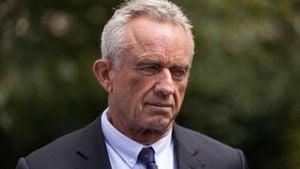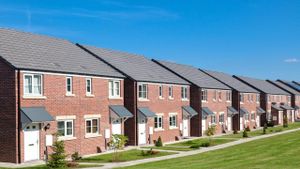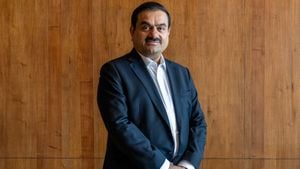Global leaders and advocates are finding themselves at the pivotal crossroads of economics and climate action, pushing for innovative solutions as the 2024 Global Economic Policy Discussions take center stage. This gathering shines a spotlight on urgent discussions surrounding sustainability, economic growth, and the role of technology, particularly artificial intelligence, amid changing geopolitical landscapes and pressing environmental challenges.
Under the slogan “Building Common Ground,” the 2024 Berlin Global Dialogue (BGD) unites thought leaders from diverse sectors to strategize on how to achieve collaborative solutions to some of the most pressing issues of our time. Held at ESMT Berlin, this newly initiated summit entertains not just the power dynamics at play but also the moral obligations tied to effective policy-making.
Kisshan Sankar, representing Yale's business and global affairs programs, shared insights from his immersive experience within the conference’s Young Voices delegation. This group, composed of students from the Global Network for Advanced Management schools, actively engaged with leaders like French President Emmanuel Macron and BlackRock CEO Larry Fink. "It was fascinating to see how each discussion wove back to the core themes of cooperation and mutual responsibility," Sankar remarked.
A standout moment for Sankar included dialogues with influential leaders on climate-adaptive policies. Macron emphasized concerns about Europe’s regulatory framework and the need for clarity and cohesion within its capital markets. He argued the necessity for Europe to bolster self-reliance, especially as dependency on external suppliers can threaten economic stability.
Throughout the summit, climate change emerged as one of the dominant themes. With urgent calls for cooperation, speakers identified finance, energy, and manufacturing as sectors needing adaptive measures. The need for regulations surrounding artificial intelligence also played a notable role. Commentators discussed the intersection of these technological advancements and environmental sustainability, pointing to the increasing footprint of data centers powering AI systems.
These conversations coincided with global discussions at COP29, where negotiations to confront climate change faced notable challenges. While many governments strategized on reducing emissions, Professor Mariana Mazzucato's dialogue at the Vatican, alongside Prime Minister Mia Mottley of Barbados, presented alternative frameworks for economic cooperation based on the common good. Mazzucato, drawing from her extensive background on public investment's role in private sector success, urged for new economic approaches rooted deeply within societal needs and environmental stewardship.
“We are at a moment where we can no longer look at economics merely through the lens of profit,” Mazzucato argued. Her appeal for integrating voices from various demographic groups acknowledged the urgency of addressing not only climate challenges but the inequalities exacerbated by these crises.
These discussions bring to light the complex relationships between economic policy, technological evolution, and environmental sustainability. With climate volatility becoming the norm, financial institutions are urged to innovate beyond traditional funding models, addressing resource allocation without compromising ecological integrity.
Further complicativity was presented during these discussions surrounding artificial intelligence's environmental impact. Benedetta Brevini highlighted the ecological costs attached to AI’s infrastructure, from mining materials to handling data waste post-consumption. “If we’re serious about sustainability,” Brevini suggested, “we must understand the entire lifecycle of these technologies. Only then can we make informed decisions about their integration.”
The economic forecasts for countries like Canada indicate complex scenarios as well. The Canadian government's tightening immigration policies could signal shifts in labor dynamics, potentially leading to slower growth. According to economic expert Tu Nguyen, rate cuts from the Bank of Canada may encourage consumer spending, but with higher expenses and financing costs embedded within the growing economy, consumers will still face challenges.
Nguyen’s projections suggest growth will likely hover around two percent by 2025, but underlying structural factors could introduce challenges. A period of demographic shifts signals the end of the rapid consumer growth driven by immigration, pushing businesses to adapt to new financial realities stemming from the pandemic-era policies.
Within this global economic narrative, the confluence of traditional policies and innovative thinking embodies the battle to address both fiscal prudence and climate urgency. Advocates stress the intertwining of social, environmental, and economic justice as foundational for future policy readings.
Mottley’s words resonate powerfully within this framework: "If when you come to the table there is no chair for you, bring your own folding chair." This sentiment embodies the necessity for active participation and legislative changes addressing climate finances, particularly impactful for developing nations seeking to balance their growth amid debt constraints.
The upcoming G20 Summit and COP30 scheduled for Brazil will mark significant platforms for these dialogues to evolve, allowing world leaders to strategize on broader systemic reforms and concrete actions to address pressing global inequalities exacerbated by climate change.
With changing tides, the discourse on economic policy is shifting from traditional methods of governance toward collaborative and integrative approaches. From the Vatican dialogues to gatherings like the BGD, leaders are being called to action, emphasizing the urgent need to align policy-making with the sustainability movement—seeking out cooperative frameworks rather than extractive ones.
Such dialogues are not just significant but necessary. The ties between economic policy and climate change have become too evident for leaders to ignore as they navigate this challenging global recession head-on. Connecting diverse voices and experiences is more than just beneficial; it is imperative if the world is to build and sustain common grounds amid rising uncertainties.
Looking forward, the hope is for these discussions to transcend borders and sectors, inspiring bold actions and comprehensive policies to secure equitable, sustainable futures for all.”



